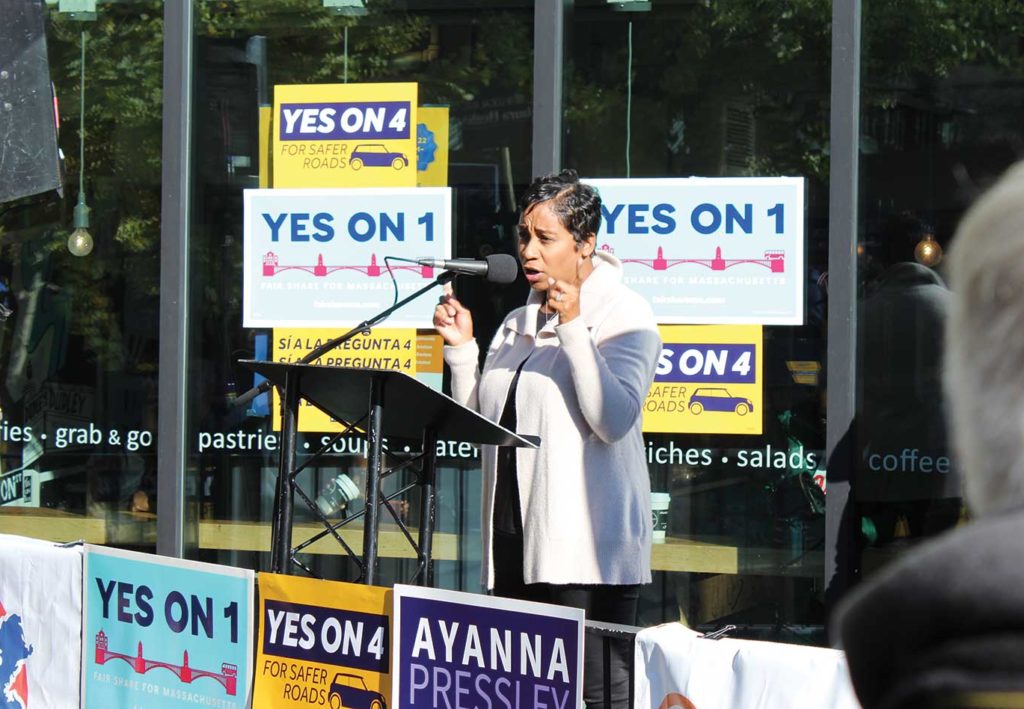
As election day draws closer, candidates are throwing their political weight behind ballot questions that will impact voters across the state. On Saturday, gubernatorial candidate Maura Healey and attorney general candidate Andrea Campbell joined advocates, union representatives and fellow elected officials to drum up support for the most contentious ballot questions, 1 and 4.
Question 1
Question 1, known as the “millionaires tax” or the “Fair Share Amendment” looks to change the Massachusetts tax system to increase the amount paid by the state’s top earners.
Massachusetts currently operates under a system known as a ‘flat tax’ system — meaning everyone pays the same rate. All Massachusetts taxpayers now pay 5% on their income. The amendment would keep the tax at 5% for income up to $1 million and add a 4% surtax to any income that exceeds $1 million. According to the Massachusetts Budget and Policy Center, less than 1% of residents would be subjected to the surtax.
The amendment calls for the additional tax revenue to be spent on public education and public transportation, though ultimately how the money is spent will be up to lawmakers.
The question has garnered backlash from opponents who fear a tax hike will drive away big business and punish property owners looking to sell their investments.
The amendment does not directly impact businesses, as corporate tax rates remain unchanged, and homeowners can subtract the original purchasing price of their property and the cost of renovations from their taxes.
Healey on Saturday, spoke in support of Question 1 and the benefits she said it will bring.
“Absolutely yes on one,” Healey told the crowd. “We need the revenue, the funding for infrastructure and education. It’s as simple as that.”
Healey’s Republican opponent, Geoff Diehl, has said he plans to vote no on Question 1 because of the fear that it will drive capital out of the state.
Campbell, the democratic nominee for Attorney General, also threw her weight behind Question 1 on Saturday.
“To demonstrate that we are for equity and fairness when it comes to economics — that is historic,” she said.
Question 4
Campbell had more to say in her address to the crowd Saturday about Question 4 — the ballot measure that could grant undocumented immigrants driver’s licenses.
“We have the opportunity to vote yes on Question 4. Not just to say we’re going to stand with our immigrant communities, but we’re going to take action to actually deliver something they’ve been fighting for for almost two decades,” Campbell said. “That has me fired up.”
Voting yes on Question 4 upholds a law passed by the Legislature in June that would provide the opportunity for immigrants to obtain legal licenses to operate a motor vehicle. It does so while removing the fear of deportation, as the state Registry of Motor Vehicles would not retain information on a driver’s immigration status.
An original version of the legislation was first submitted to state lawmakers nearly 20 years ago.
Dubbed the “Work and Family Mobility Act” the current iteration of the law has strong support from immigrant rights groups, unions and a coalition of law enforcement officials hoping to make the roads safer.
Mimi Ramos, the executive director of New England United 4 Justice and a member of the Driving Mass Families Forward Coalition said Saturday that she has been one of the people pushing for the law for years.
“This is about safer roads and justice for us all,” she said, citing statistics of states that have seen decreases in accidents and arrests related to driving without licenses.
Opponents, including Diehl, have spoken vehemently against the law and have urged voters to check no on their ballots. Nay-sayers believe Question 4 would open the door to voter fraud, despite promises by advocates it will have no impact on elections.
Healey, who will be voting yes on 4, has doubled down on the fact that the law will only serve to improve the Commonwealth.
“This is a matter of making sure that we know who is on the roads that we know that they are trained,” she said.
Questions 2 and 3
Question 2, which has not been as divisive, looks to mandate that insurance providers spend the majority of premiums for dental insurance on patient care. Companies will be required to spend 83 cents of every dollar on care.
Supporters, mainly dentists, say the question improves care and holds insurance companies accountable, while opponents fear the measure will raise premiums.
Healey has not taken a strong position, while her opponent, Diehl, said he plans on voting no.
Question 3, which the Healey camp also has not made a public decision on, would expand the granting of state liquor licenses for beer and wine sales while clamping down on the sale of hard liquor.
A ‘yes’ vote would increase the number of licenses for a single company to sell beer and wine from 9 to 18 and decrease the number of licenses for hard alcohol sales for one company from 9 to 7.
Diehl has said he plans to vote yes.






